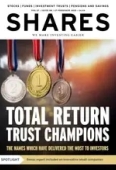Archived article
Please note that tax, investment, pension and ISA rules can change and the information and any views contained in this article may now be inaccurate.
What should I do about changes to inheritance tax on pensions?

I am getting concerned about the changes to inheritance tax on pensions.
I am 78 years old, and my wife is 68. We have two grown up children with families of their own. My wife is in good health, whereas I have the usual sort of challenges befitting my age.
Our total estate is worth about £900,000, including the house. I get a company pension payment every month, that should pass onto my wife when I die. I also have a SIPP which my wife will inherit.
Is there anything I should be doing now?
Geoff
Rachel Vahey, AJ Bell Head of Public Policy, says:
With such a potentially monumental change to pensions on the horizon, it’s natural to want to take action to mitigate any downside.
However, before you rush to act, a reminder that although the chancellor announced this measure in her Budget speech last October, we don’t yet have the final detail of how this will work in practice. HMRC recently consulted on the technical detail, but most respondents came back saying it would be difficult to implement the proposals as outlined, and changes should be made.
We very much hope the Treasury is in listening mode and finds a better way of applying tax on pensions when someone dies; a way that would result in fewer costs, delays and financial distress for the loved ones left behind.
CONSIDER YOUR NOMINATION FORM
In the meantime, you could consider your nomination form. If you die with a surviving spouse or civil partner, any of your estate passed to them will be exempt from inheritance tax. Your unused nil rate band and residence nil rate band will also pass to them. A married couple could therefore have up to £1 million of nil rate band (assuming they pass the house to children or grandchildren).
At the moment, pensions are usually exempt from inheritance tax. But from April 2027, that is proposed to change, and pensions will be brought into the scope of inheritance tax. The proposals are that any nil rate band will be proportioned across the pension as well. Anything in excess should be subject to 40% inheritance tax, but with the same exemption if passed to a spouse.
If your total estate, including your pension, is likely to exceed the nil rate band, then one area you may want to consider now is your expression of wishes nomination.
Under the current rules, the trustees of a pension scheme normally decide who should inherit any unused pension funds. A pension saver can complete an expression of wishes (or nomination) form nominating someone to inherit the fund. Trustees will take into account the form when they are making the decision, along with other evidence, for example any Will, or representations from people wanting to inherit. However, trustees aren’t usually bound by the nomination. Instead, they are free to make their own choice.
If the person the trustees decide should inherit is either a dependant of the pension saver or someone nominated by them, then that person can choose to take the inherited pension fund as an income through drawdown or as a lump sum. Otherwise, generally, the person can only take a lump sum.
A couple may have set up their arrangements so the pension is inherited by the other when they die, with the intention it will then be passed onto children on the second death.
MIGHT BE WORTH CONSIDERING A CHANGE
However, pension savers don’t have to nominate a dependant. Considering the potential changes to inheritance tax on pensions, those with large funds may now want to change their expression of wishes form to nominate adult children.
That way, if they die before April 2027, the children will inherit the pension fund without paying inheritance tax on any excess above the nil rate band. Instead, if it passes to the spouse, if they die after April 2027, the children will face inheritance tax on the pension funds.
If the pension saver is still alive in April 2027, then they can change their nomination form back to their spouse, who can inherit the fund without paying inheritance tax.
This approach only works if the spouse has enough money to live on from other assets in the estate and doesn’t need the pension for an income. But if they don’t, then it may be a neat way of passing the pension to children (as always intended) without paying inheritance tax, especially if the spouse is significantly younger or in better health than the pension saver.
Important information:
These articles are provided by Shares magazine which is published by AJ Bell Media, a part of AJ Bell. Shares is not written by AJ Bell.
Shares is provided for your general information and use and is not a personal recommendation to invest. It is not intended to be relied upon by you in making or not making any investment decisions. The investments referred to in these articles will not be suitable for all investors. If in doubt please seek appropriate independent financial advice.
Investors acting on the information in these articles do so at their own risk and AJ Bell Media and its staff do not accept liability for losses suffered by investors as a result of their investment decisions.
Issue contents
Feature
Great Ideas
News
- Rentokil has a long way to go to catch up with US peer Rollins
- Centrica shares hit fresh 12-month high despite normalised trading
- German election result promises continuity as the centre holds
- Why Brown-Forman investors are in need of a stiff drink
- No easy way back for embattled B&M
- Buffett keeps his powder dry as Berkshire Hathaway’s cash pile tops record $134 billion
- Glencore slips to multi-year lows on weak coal price as it mulls London exit
 magazine
magazine








